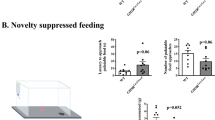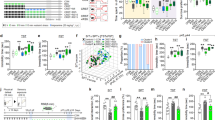Abstract
We found that increasing ghrelin levels, through subcutaneous injections or calorie restriction, produced anxiolytic- and antidepressant-like responses in the elevated plus maze and forced swim test. Moreover, chronic social defeat stress, a rodent model of depression, persistently increased ghrelin levels, whereas growth hormone secretagogue receptor (Ghsr) null mice showed increased deleterious effects of chronic defeat. Together, these findings demonstrate a previously unknown function for ghrelin in defending against depressive-like symptoms of chronic stress.
This is a preview of subscription content, access via your institution
Access options
Subscribe to this journal
Receive 12 print issues and online access
$209.00 per year
only $17.42 per issue
Buy this article
- Purchase on Springer Link
- Instant access to full article PDF
Prices may be subject to local taxes which are calculated during checkout


Similar content being viewed by others
References
Lutter, M. et al. J. Neurosci. 28, 3071–3075 (2008).
Zigman, J.M. & Elmquist, J.K. Endocrinology 144, 3749–3756 (2003).
Zigman, J.M. et al. J. Clin. Invest. 115, 3564–3572 (2005).
Krishnan, V. et al. Cell 131, 391–404 (2007).
Asakawa, A. et al. Neuroendocrinology 74, 143–147 (2001).
Kristenssson, E. et al. Regul. Pept. 134, 114–117 (2006).
Abizaid, A. et al. J. Clin. Invest. 116, 3229–3239 (2006).
Diano, S. et al. Nat. Neurosci. 9, 381–388 (2006).
Lawrence, C.B., Snape, A.C., Baudoin, F.M. & Luckman, S.M. Endocrinology 143, 155–162 (2002).
Yamanaka, A. et al. Neuron 38, 701–713 (2003).
Mundinger, T.O., Cummings, D.E. & Taborsky, G.J. Jr. Endocrinology 147, 2893–2901 (2006).
Jimerson, D.C. & Wolfe, B.E. CNS Spectr. 9, 516–522 (2004).
Acknowledgements
The authors thank C.E. Lee, M. Choi and M. Perello. This work was supported by grants from the US National Institutes of Health (K08DK068069-01A2, R01DK71320, P01DK56116, RL1DK081185, P50MH66172 and ADA 1-06-JF-59), a Foundation for Prader-Willi Research Grant, an NARSAD Young Investigator Award and a University of Texas Southwestern Disease-Oriented Clinical Scholars Award. M.Y. is a Howard Hughes Medical Institute investigator.
Author information
Authors and Affiliations
Contributions
M.L. and J.M.Z. conceived, designed and performed these studies, analyzed the data and wrote the manuscript. I.S. assisted on all pharmacologic experiments. S.O.-L., S.A.R. and J.G.A. maintained the mouse colony and genotyped the mice. S.B. and S.J. assisted with the behavioral testing. M.Y. provided the orexin-deficient mice. J.K.E. and E.J.N. helped supervise and fund these studies, and critiqued the manuscript.
Corresponding author
Supplementary information
Supplementary Text and Figures
Supplementary Figures 1–4 and Supplementary Methods (PDF 160 kb)
Rights and permissions
About this article
Cite this article
Lutter, M., Sakata, I., Osborne-Lawrence, S. et al. The orexigenic hormone ghrelin defends against depressive symptoms of chronic stress. Nat Neurosci 11, 752–753 (2008). https://doi.org/10.1038/nn.2139
Received:
Accepted:
Published:
Issue Date:
DOI: https://doi.org/10.1038/nn.2139
This article is cited by
-
The effect of Ramadan fasting on mental health and some hormonal levels in healthy males
The Egyptian Journal of Neurology, Psychiatry and Neurosurgery (2023)
-
Childhood sexual abuse is associated with higher total ghrelin serum levels in adulthood: results from a large, population-based study
Translational Psychiatry (2023)
-
Meranzin Hydrate Improves Depression-Like Behaviors and Hypomotility via Ghrelin and Neurocircuitry
Chinese Journal of Integrative Medicine (2023)
-
Acyl-Ghrelin Attenuates Neurochemical and Motor Deficits in the 6-OHDA Model of Parkinson’s Disease
Cellular and Molecular Neurobiology (2023)
-
The role of epigenetics in anxiety disorders
Molecular Biology Reports (2023)



